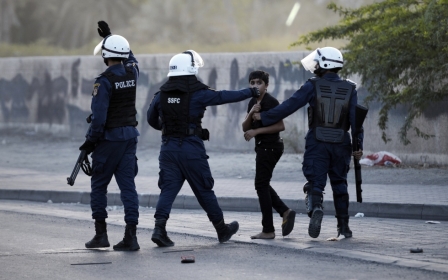Little hope of end to Bahrain political deadlock after poll

Tiny Gulf monarchy Bahrain holds elections on Saturday but with the opposition boycotting there seems little hope of an end to political deadlock in the key US ally.
Bahrain remains divided nearly four years after security forces in the kingdom clamped down on protests led by demonstrators taking their cue from the Arab Spring uprisings.
The opposition is demanding a "real" constitutional monarchy with an elected prime minister who is independent from the ruling royal family.
But the Al-Khalifa dynasty has refused to yield.
Bahrain is home to the US Fifth Fleet and is one of several Arab states supporting US-led airstrikes against the Islamic State group in Iraq and Syria, making it a vital Western ally.
Turnout on Saturday is likely to be low as the main opposition party has already called for a boycott.
Campaigning has been subdued, even if the streets of the capital are festooned with election posters.
A rally organised by Adel al-Dhawadi, a candidate for the Islamic Forum party, outside Manama Wednesday attracted just a few dozen supporters.
"Everyone is free to participate in elections or to boycott them. But it is better to participate and get involved in change," said Salah Massameha, a retired academic who attended the gathering.
Candidates from organised movements will compete with independent hopefuls after the Shiite Al-Wefaq Association and other opposition groups announced a boycott.
In addition to the Islamic Forum, which is close to Egypt's banned Muslim Brotherhood, the Salafist Al-Asalah and the National Unity Assembly will field some of the 266 contenders for the 40-member parliament.
'Lacking political experience'
The general election will be the first since the 2011 protests, which saw Al-Wefaq withdraw its 18 lawmakers after a violent crackdown on demonstrators by security forces.
They were later replaced in restricted polls in which the opposition refused to participate.
Analyst Ali Fakhro said the opposition boycott meant Bahrain's next parliament would not offer a fair reflection of public opinion.
Candidates are mainly "businessmen and professionals who lack experience in politics" and will be unable to bridge social divides, he added.
The rulers have consolidated their grip on power since the protests, when dozens of leading opposition activists were arrested and jailed.
Yet pockets of dissent remain.
Not long after the crackdown, demonstrators returned to the streets of villages in spite of violent clashes with security forces.
Al-Wefaq always distanced itself from the violence, marketing its struggle as essentially peaceful.
Authorities ignored pleas by human rights groups last year to release political prisoners, instead increasing the punishment for violent crimes.
Attacks that cause death or injuries can now be met with capital punishment or life imprisonment.
Is Iran intervening?
Some fear Bahrain is caught between Shiite Iran and Sunni Saudi Arabia -- the tiny kingdom's main backer.
Bahrain faces "a horrible sectarian division," said Fakhro, a former minister who has been involved in dialogue efforts between the government and the opposition.
Abdullah al-Hawihy, head of the central committee of the National Unity Assembly, a Sunni body created in the wake of demonstrations, said Bahrain's protest movement showed the "Iranian agenda in the Arab region".
"Some want to push us towards a sectarian conflict," he added.
Hawihy also criticised the opposition election boycott.
"Those who do not take part will lose," he said. "It is under the dome of the parliament that we can discuss divisive issues."
Al-Wefaq member Abdulmajeed al-Saba accused authorities of trying to "terrorise people into voting."
A government official dismissed the claim.
"The Bahraini people are more determined than ever to exercise their constitutional right to vote and reinforce the democratic experience despite certain calls for boycott," he said.
But few ordinary Bahrainis appear to share this enthusiasm.
"The candidates seek prestige only," said Haydar, a 32-year-old taxi driver who has no plan to vote.
The government is reportedly promising voters of having a "priority" in matters of employment and services.
Stay informed with MEE's newsletters
Sign up to get the latest alerts, insights and analysis, starting with Turkey Unpacked
Middle East Eye delivers independent and unrivalled coverage and analysis of the Middle East, North Africa and beyond. To learn more about republishing this content and the associated fees, please fill out this form. More about MEE can be found here.




